Key takeaways:
- Performance anxiety is a common experience, affecting many in high-stakes situations, not just performers and athletes.
- Recognizing triggers such as environment, past experiences, and self-talk is essential for managing anxiety.
- Effective coping strategies include visualization, breath control, positive affirmations, and relaxation techniques like progressive muscle relaxation.
- Seeking professional support, including therapy and coaching, can significantly help in overcoming performance anxiety.
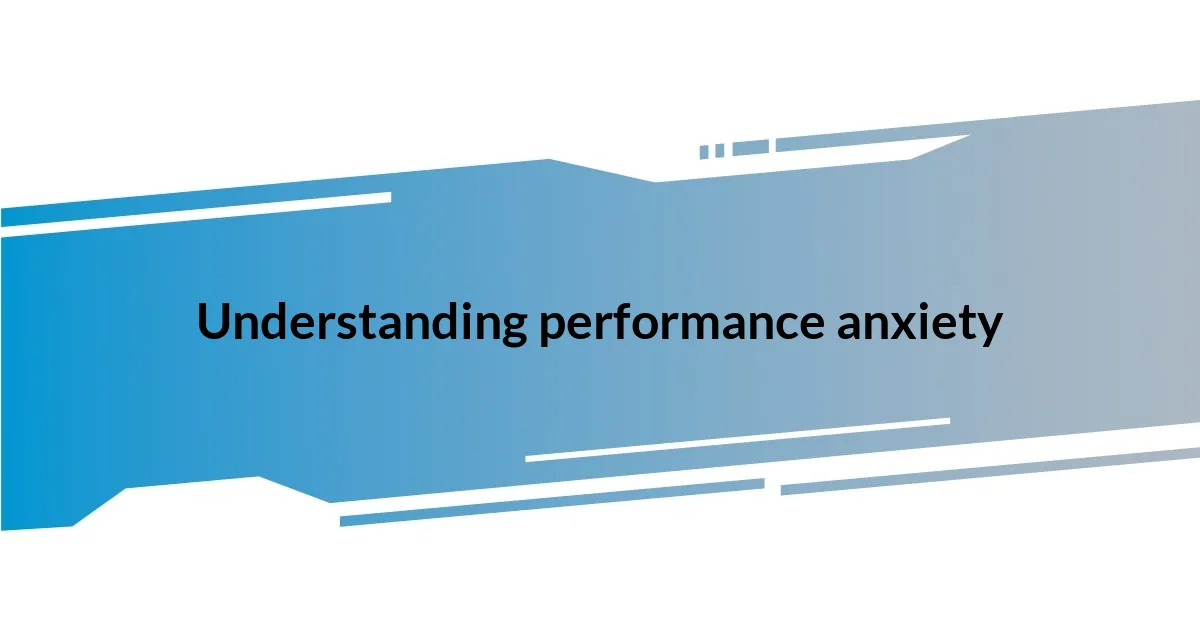
Understanding performance anxiety
Performance anxiety can feel like an unwelcome shadow, creeping in just before an important moment. I remember standing backstage, heart racing, questioning my abilities just minutes before stepping onto the stage. Why does something I love become so daunting?
It’s fascinating how our minds can amplify pressure, turning simple tasks into monumental challenges. I often reflect on my own experiences—like when I was unprepared for a presentation and felt the weight of judgment in the room. Isn’t it interesting how we often worry more about what others think than the quality of our own performance?
Understanding performance anxiety means recognizing that it’s a natural human response. I’ve learned it doesn’t just happen to performers or athletes; many face it during everyday situations. How do we start to manage these feelings instead of allowing them to control us? By sharing our stories, we can demystify this common experience together.
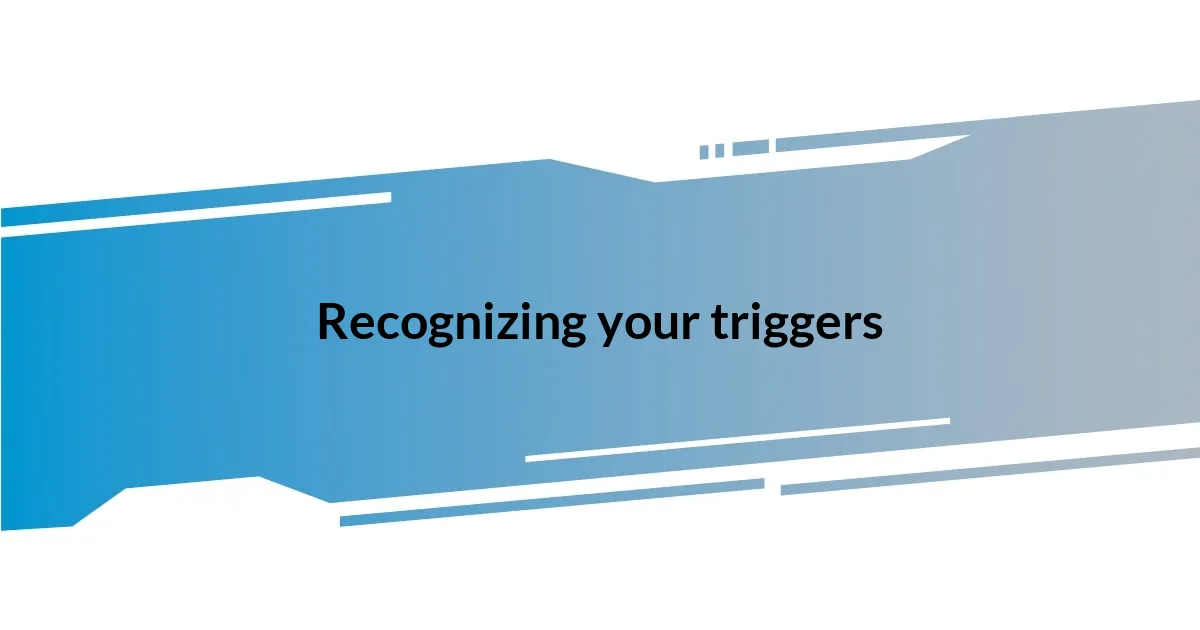
Recognizing your triggers
Recognizing your triggers is a crucial step in managing performance anxiety. It’s like identifying the moments that send your mind into overdrive. I remember the time I had to give a speech at a wedding; as soon as I heard my name called, my stomach twisted into knots. I realize now that the fear of judgment and the high stakes of the event were my key triggers.
To effectively recognize your triggers, consider the following points:
- Environment: Are there specific settings that make you feel anxious, like crowded rooms or silent audiences?
- Past Experiences: Reflect on previous situations where anxiety struck. What common threads do you see?
- Self-Talk: Notice the thoughts that loop in your mind right before a performance. Are they positive or negative?
- Physical Sensations: Pay attention to your body—does your heart race, or do your palms sweat? These can signal a performance trigger.
- Expectations: Consider the pressure you put on yourself. Are your standards unrealistically high?
By delving into these aspects, I believe we can start to peel back the layers of our anxiety.
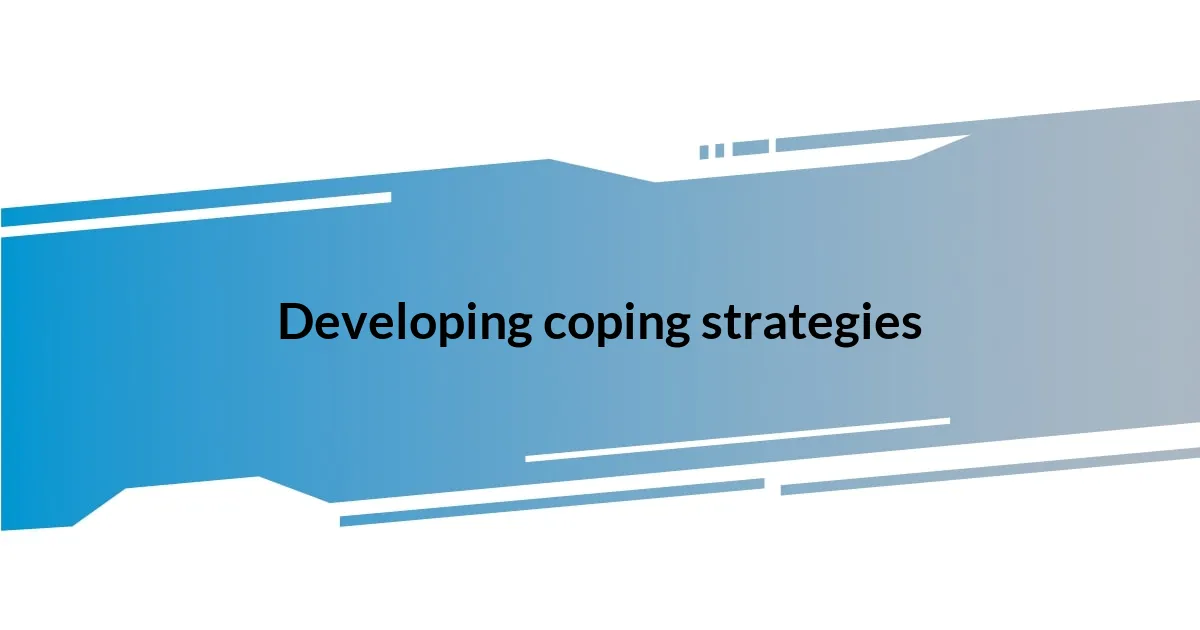
Developing coping strategies
Developing effective coping strategies has been essential in my journey to overcome performance anxiety. One method that resonates deeply with me is visualization. Before facing a challenging situation, I take a moment to close my eyes and picture myself succeeding. I find that imagining the audience’s supportive reactions helps to calm my nerves significantly. What strategies resonate with you?
Another technique I’ve discovered is the power of breath control. In moments of anxiety, I often concentrate on my breathing, taking deep, slow breaths. This simple practice keeps me grounded and serves as a reminder to stay present. I remember a time when I felt a wave of panic before a presentation, but by focusing on my breath, I regained my composure quickly. Isn’t it incredible how something as basic as breathing can anchor us?
Lastly, I have learned the importance of positive affirmations. Repeating empowering phrases to myself—like “I am prepared” or “I can handle this”—provides a much-needed boost. I even keep a small notepad with my favorite affirmations and glance at it before going on stage. This way, I equip myself with the mental armor needed to face the challenge ahead.
| Strategy | Description |
|---|---|
| Visualization | Picturing yourself succeeding to reduce nerves. |
| Breath Control | Focusing on deep, slow breaths during anxiety. |
| Positive Affirmations | Using empowering phrases to boost confidence. |
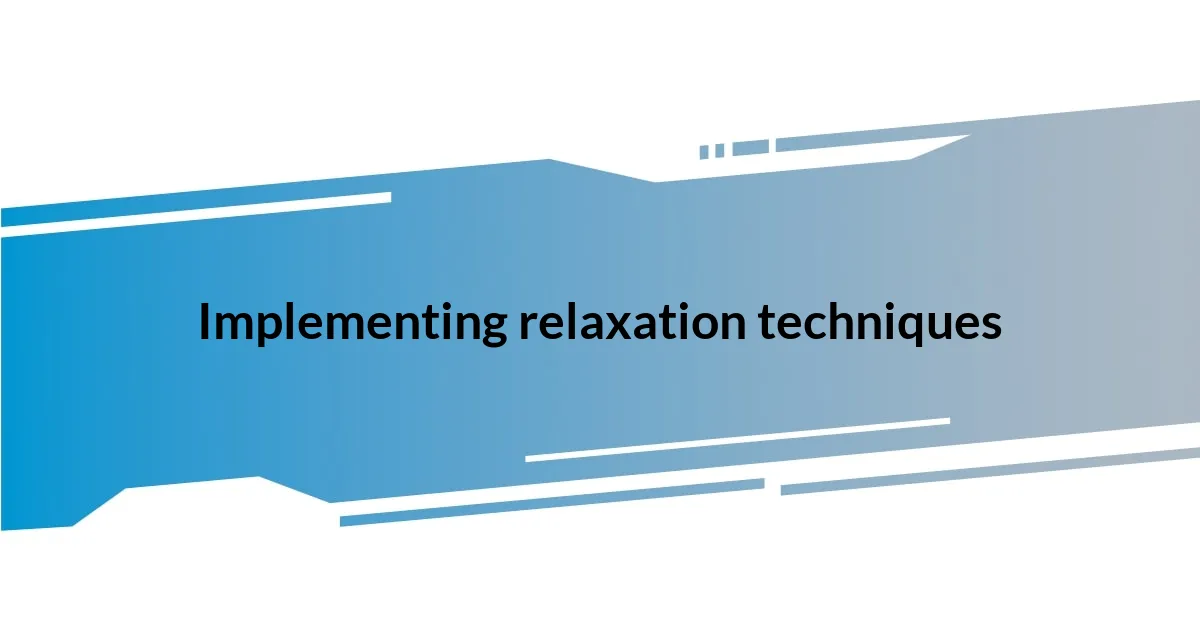
Implementing relaxation techniques
Implementing relaxation techniques can really make a difference when facing performance anxiety. One technique I often turn to is progressive muscle relaxation. I remember the first time I tried it; I was in my car, waiting to go into a meeting. I took a moment to consciously relax each muscle group, starting from my toes and moving all the way up to my head. What surprised me was how quickly my tension melted away, and I felt lighter and more focused. Have you ever tried to just release that anxiety through your body?
Another approach that has benefited me is incorporating mindfulness into my routine. Sitting in silence for just a few minutes and paying attention to my thoughts can be incredibly grounding. I recall a stressful day when I took a ten-minute break to meditate. I focused on my breath and allowed my mind to quiet down. That simple act let me face the rest of the day with a refreshed perspective. Isn’t it amazing how just a slice of time can transform our mental state?
Lastly, I’ve found guided imagery to be another powerful tool. This technique involves picturing a serene place, like a beach or a quiet forest. When I was preparing for a big presentation, I visualized myself standing confidently in front of the audience surrounded by warmth and support. This vivid mental escape not only eased my nerves but also helped me to project calmness and authority. Have you ever taken a moment to travel to a safe space in your mind before a big moment?
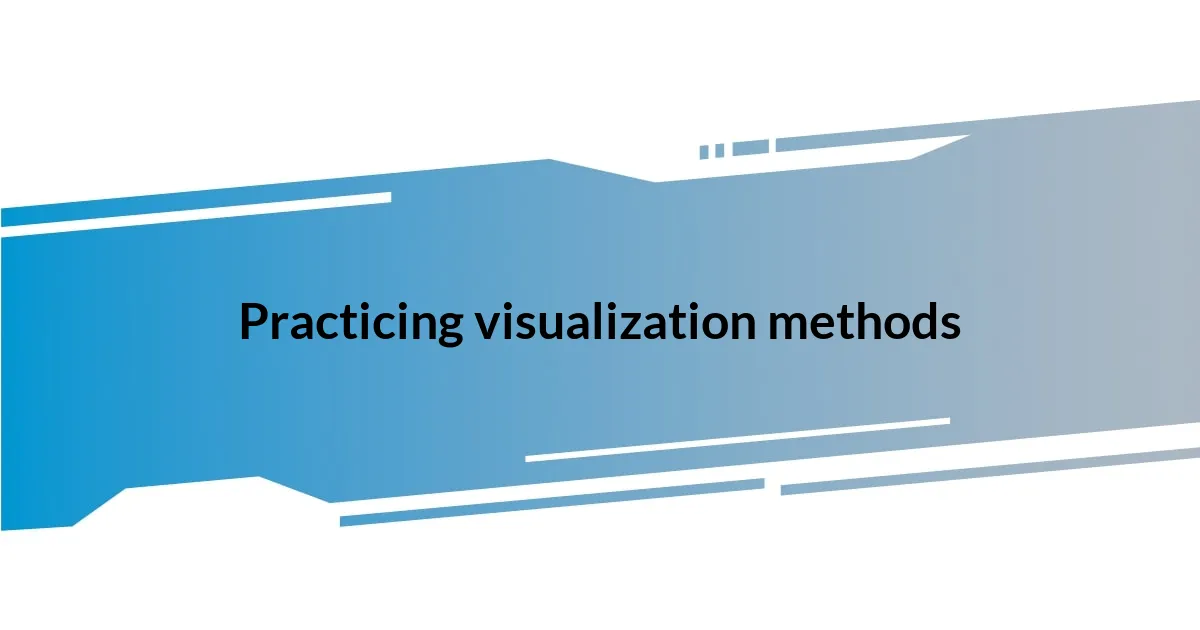
Practicing visualization methods
Practicing visualization methods has always been a game-changer for me when it comes to tackling performance anxiety. I remember a time before a big presentation when I spent a few minutes alone to visualize the entire experience. I imagined myself walking onto the stage confidently, looking at supportive faces, and delivering my message seamlessly. That mental rehearsal created a sense of familiarity, which helped to quiet my nerves significantly, making me wonder just how powerful our imagination can be.
I often find that the more detailed my visualization, the more effective it becomes. For instance, during my last performance, I envisioned not only the audience’s reactions but also the feelings coursing through me—joy, excitement, and a sense of achievement. It was as if I could almost feel the applause before it even happened. Isn’t it fascinating how crafting such vivid mental scenes can substantially influence our emotional state? Creating this clarity in my mind paved the way for a smoother and more confident delivery.
What I’ve also learned is the importance of repeating these visualization sessions regularly. A few weeks ago, I made it a point to visualize different scenarios, whether it was speaking to a small group or presenting to a larger crowd. Each practice session left me feeling a little bolder and more prepared. The consistency built a bridge between my mental image and actual reality. Have you thought about what consistent practice in visualization could achieve for you? By nurturing that mindset, I know I can conquer any stage I face.
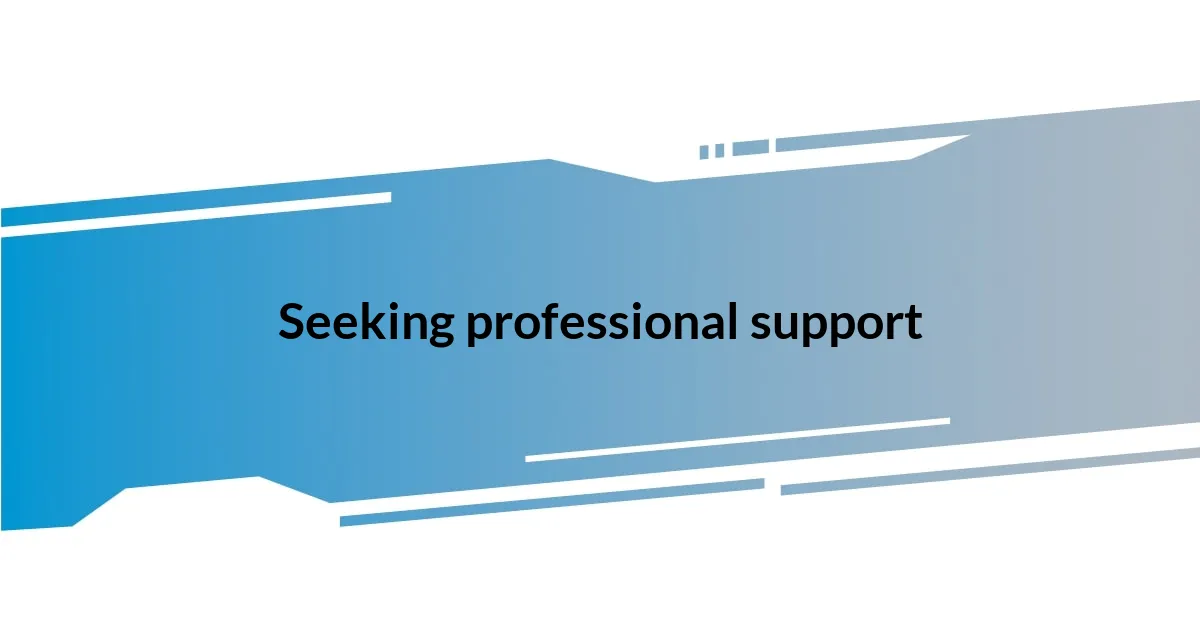
Seeking professional support
Seeking professional support can be a crucial step when dealing with performance anxiety. I remember the first time I decided to work with a therapist. It felt daunting, but I was blessed to find someone who truly understood what I was going through. They guided me through cognitive-behavioral techniques, helping me to reframe negative thoughts. I often wonder how different my journey would have been without that support.
Engaging in group therapy was another transformative experience for me. Sharing my struggles with others facing similar challenges created a sense of community that I didn’t realize I needed. One memorable session involved a role-playing exercise where we practiced presenting to each other. It was both terrifying and liberating. Have you ever felt the power of shared vulnerability? That sense of solidarity made it easier to face my fears, reminding me that I wasn’t alone in this battle.
Finally, I found value in seeking guidance from a performance coach. The personalized strategies they provided were eye-opening. I recall a coaching session where I learned how to harness my anxiety as a source of energy rather than fear. That shift in perspective was a game-changer for me. Isn’t it incredible how the right support can transform anxiety into a powerful motivator? Engaging with professionals has taught me that asking for help doesn’t signify weakness; it signifies strength and commitment to overcoming obstacles.
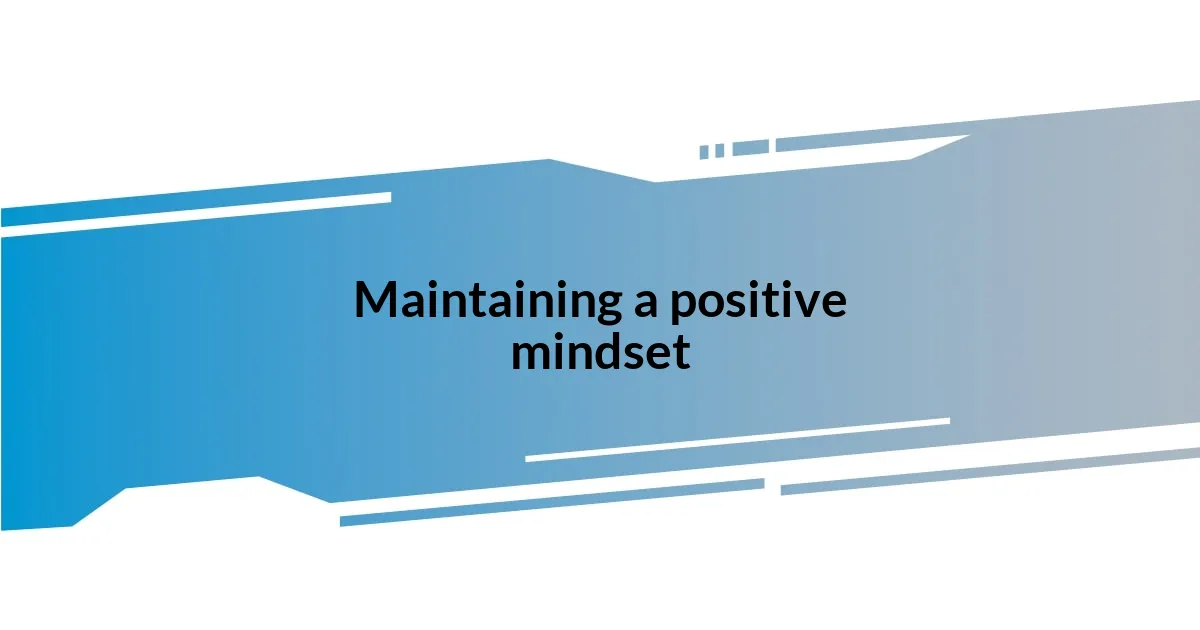
Maintaining a positive mindset
Maintaining a positive mindset is something I continually strive for, especially when facing performance anxiety. I recall a time when I had to give a speech at a wedding. Instead of fretting about the potential blunders, I made it a point to focus on the joy of celebrating love with friends and family. Shifting my focus from self-doubt to appreciating the moment transformed my nerves into excitement. Have you ever noticed how reframing your perspective can alter your emotional landscape?
In my experience, daily affirmations have played a significant role in nurturing a positive mindset. Each morning, I take a shower and recite phrases like, “I am capable,” or “I will shine today.” There’s something empowering about reinforcing those beliefs, and it allows me to start the day with confidence instead of anxiety. When was the last time you consciously reminded yourself of your strengths? These small yet powerful practices serve as building blocks for my mental resilience.
I also make it a habit to embrace gratitude, particularly before entering a high-pressure situation. I remember standing backstage for a talk I was anxious about, pausing to jot down three things I was grateful for—my supportive friends, the opportunity to share my message, and my growing confidence. That moment of reflection grounded me and replaced my anxiety with a sense of appreciation for the experience ahead. How often do we pause to recognize the good in our lives, especially before challenges? By cultivating a gratitude mindset, I feel more equipped to face any stage with a positive spirit.